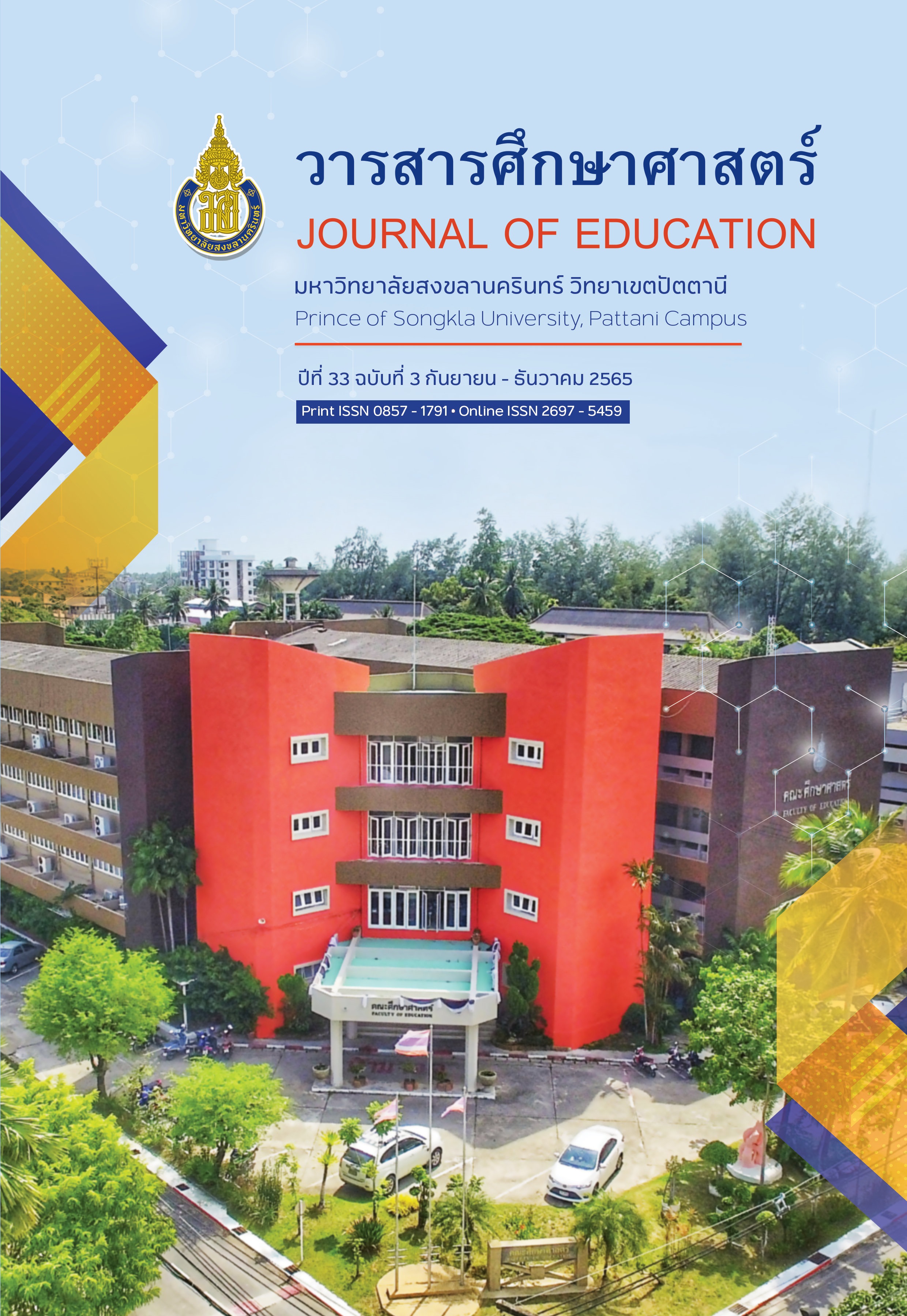เหตุปัจจัย มุมมองและแนวทางการพัฒนาคุณภาพผู้เรียนระดับมัธยมศึกษาตอนต้น สังกัดสำนักงานคณะกรรมการการศึกษาขั้นพื้นฐาน (สพฐ.) ในจังหวัดปัตตานีที่ได้รับผลกระทบจากสถานภาพทาง สังคมและเศรษฐกิจ ในสถานการณ์การแพร่ระบาดของเชื้อไวรัสโคโรนา 2019 (COVID-19)
Main Article Content
บทคัดย่อ
การวิจัยนี้มีวัตถุประสงค์เพื่อ 1) ศึกษาเหตุปัจจัยที่ส่งผลต่อคุณภาพผู้เรียนระดับมัธยมศึกษาตอนต้น และ 2) ศึกษามุมมองและแนวทางการพัฒนาคุณภาพผู้เรียนระดับมัธยมศึกษาตอนต้น สังกัด สพฐ. ในจังหวัดปัตตานี ที่ได้รับผลกระทบจากสถานภาพทางสังคมและเศรษฐกิจ (Socio-economic Status: SES) ในสถานการณ์การแพร่ระบาดของเชื้อไวรัสโคโรนา 2019 (COVID-19) ผู้วิจัยแบ่งการดำเนินการวิจัยเป็น 2 ระยะ คือ ระยะที่ 1 ศึกษาเหตุปัจจัยที่ส่งผลต่อคุณภาพผู้เรียนในสถานการณ์โควิท-19 ผู้ที่ให้ข้อมูลสำคัญ 12 ท่าน ได้มาโดยการเลือกแบบเจาะจง ประกอบด้วย ผู้อำนวยการโรงเรียน ครูที่ปรึกษานักเรียน ผู้ปกครอง และนักเรียน และระยะที่ 2 รวบรวมมุมมองและแนวทางการพัฒนาคุณภาพผู้เรียนสถานการณ์โควิท-19 มีผู้ที่ให้ข้อมูลสำคัญ 5 ท่าน ได้มาโดยการเลือกแบบเจาะจง ประกอบด้วย ผู้บริหาร หัวหน้าส่วนราชการ และบุคลากรหน่วยงานที่เกี่ยวข้องกับการศึกษา ทั้ง 2 ระยะใช้เครื่องมือที่ใช้เป็นแบบสัมภาษณ์แบบกึ่งโครงสร้างและวิเคราะห์ข้อมูลด้วยการวิเคราะห์เชิงเนื้อหา
ผลการวิจัยพบว่า 1) เหตุปัจจัยที่ส่งผลต่อคุณภาพผู้เรียน ด้าน SES ระดับครอบครัว คือ ผู้ปกครองมีฐานะยากจน ไม่มีความสามารถในการซื้ออุปกรณ์การเรียนออนไลน์ หลายครอบครัวไม่มีสัญญาณ Internet และผู้ปกครองไม่มีเวลาดูแลนักเรียนระหว่างที่นักเรียนศึกษาบทเรียนที่บ้าน เนื่องจากต้องทำงาน ด้าน SES ระดับโรงเรียน คือ การจัดการเรียนการสอนระยะโรคระบาดขาดประสิทธิภาพ เช่น ครูไม่สามารถจัดการสอนผ่านระบบออนไลน์ทั้งเชิงปริมาณและคุณภาพ ด้าน SES ระดับชุมชน คือ ชุมชนมีความเชื่อทีต่อต้านในการฉีดวัคซีนป้องกันโควิด-19 และชุมชนไม่มีความปลอดภัยในชีวิตและทรัพย์สิน 2) มุมมองและแนวทางการพัฒนาคุณภาพผู้เรียน ได้แก่ รัฐ ชุมชนและโรงเรียนควรจัดอุปกรณ์การเรียน และสัญญาณ Internet ให้กับนักเรียนฟรี ครอบครัวควรติดตามการเรียนของนักเรียนในแต่ละวัน รัฐควรเพิ่มเงินเยียวยาให้กับนักเรียน ชุมชนควรดูแลกันและกัน สิ่งสำคัญคือการพัฒนาครูให้มีสมรรถนะทางด้านเทคโนโลยีและการสื่อสารผ่านระบบออนไลน์
Article Details

อนุญาตภายใต้เงื่อนไข Creative Commons Attribution-NonCommercial 4.0 International License.
เอกสารอ้างอิง
Bangkokbiznews. (2021). Thailand Learning: knowledge of enhancing online learning in post COVID-19. Retrived from https://www.bangkokbiznews.com/social/983982 [in Thai]
Baquedano-López, P., Alexander, R. A., & Hernández, S. J. (2013). Equity issues in parental and community involvement in schools: What teacher educators need to know. Review of research in education, 37(1), 149–182. https://doi.org/10.3102/0091732X12459718
Busemeyer, M.R. (2012). Inequality and the political economy of education: An analysis of individual preferences in OECD countries. Journal of European social policy, 22(3), 219–240.
Department of Disease Control. (2020). Information about COVID-19 Coronavirus in Thailand. Retrieved from https://ddc.moph.go.th/viralpneumonia/index.php [in Thai]
Department of Disease Control. (2021). Annual report 2020. Bangkok: Graphic and design. [in Thai]
Jiayi, W. & Ying, L. (2009). Research on the teaching quality of compulsory education in China’s West rural schools. Educ China, 4(1), 66–93
Kasikorn Research Center. (2021). Business trend analysis. Retrieved from https://kasikornresearch.com/th/analysis/kecon/economy/Pages/TH-GDP-y3946.aspx
Kemsorn, K. (2016). Development Guidelnes of The Student Quality of Klongkhlungratrangsan School Klongkhlung Sub-District Klongkhlung District Kamphaengphet Province. Educational master in educational administration. Kamphaeng Phet Rajabhat University. [in Thai]
Limcharoen, S. (2021). Learning Management in the COVID-19 epidemic situation: A case study of not attending in school. Retrieved from https://www.sakonarea1.go.th/news_file/p60033381016.pdf [in Thai].
Marks, G.N., Cresswell, J. & Ainley, J. (2007). Explaining socioeconomic inequalities in student achievement: The role of home and school factors. An International Journal on Theory and Practice, 12(2), 105-128.
Ministry of education. (2020). Standard curriculum B.E. 2551. Bangkok: Agricultural Cooperative Community of Thailand. [in Thai]
Nissabho, S. (2021). Teaching and Learning under the circumstances of COVID-19. Journal of MCU. Loei review, 2(1), 112 – 118.
Pharcharuen, W. (2021). Educational disparities of Thai citizens studying age with the online with the online learning situation in the viral age COVID-19. PaññaPanithan Journal, 6(1), 1-14. [in Thai]
Phuworawan, Y. (2022). COVID-19: Prevention and control measures entering the 3rd year, the situation has changed accordingly. Bangkokbiznews. Retrived from https://www.bangkokbiznews.com/social/991251 [in Thai]
Poovorawan, Y & Poovorawan, Y. (2020). Covid-19 and epidemiology: Online lessons for students and citizens. Retrieved from https://learningcovid.ku.ac.th/ [in Thai]
Promwong, W., Prasantree, T. and Sriputtarin, S. (2021). Current Situations, Problems and Solutions to Learning Management Problems the Corona Virus Pandemic (COVID-19) of Schools under The Nakhon Phanom Primary Educational Service Area Office 1. Rajapark journal, 15(40), 200- 213 [in Thai]
Public Health Commission. (2020). Doctors point out how COVID affects towards a new way of life in society. The new way of life impacted of the COVID-19 in Doctors’ opinion. Retrieved from https://www.dailynews.co.th /politics/771154. [in Thai]
Sanongkun, Y. (2013). Problems and solutions for student dropout in small sized schools under Secondary educational service area office 11 in Suratthani. Educational master degree in Educational administration. Prince of Songkla University, Surathani Campus.
Scrimin, S., Mastromatteo, L. Y., Hovnanyan, A., Rubaltelli, E. and Pozzoli, T. (2022). Effects of socioeconomic status, parental stress, and family support on children’s physical and emotional health during the COVID-19 pandemic. Journal of Child and Family Studies, 31(7), 2215–2228.
Share, J. & Share, K. (1994). Beyond the Conventional Wisdom: Rural Development as if Australia's Rural People and Communities Really Mattered. Journal of Research in Rural Education, 10(1) 2 – 43.
Suntornanan, T. (2014). the right to education and the free of charge education in Thailand. Huachiew Chalermprakiet law Journal, 2(5), 81–96.
Suwanworaboon, S. & Haruthaithanasan, T. (2019). Low O-NET Scores in Southern Frontier: Origin of the Issue and Alternative in Problem Management. Academic services journal, 31(1), 255-269. [in Thai]
Thinsandee, T. & Sangchatree, P. (2021). 5 Models for Teaching Management in Emerging Disease Situations. Ratanabuth Journal, 3(3), 66–73. [in Thai]
Thonghattha, M. (2021). States of online learning management in the epidemic situation of coronavirus disease 2019 (COVID-19) of teachers in foreign languages department in Parkpanang school, Nakhonsri-Thammarat. Journal of Lawasri Thepsatri Rajabhat University, 5(1), 43-52. [in Thai]
Thongmark, S., Niemted W., Choosuwan R., and Sittichai R. (2017). Academic administration strategies in enhancing the educational quality of multicultural society for secondary schools in three southern border provinces. Academic services journal, 29(3), 64-73. [in Thai].
Tinto, V. (1993). Building community. Liberal Education, 79(4), 16–21.
World Bank. (2020). OECD Economic surveys economic assessment Thailand. Retrieved from https://www.oecd.org/economy/surveys/Economic-assessment-thailand-overview-2020.pdf


